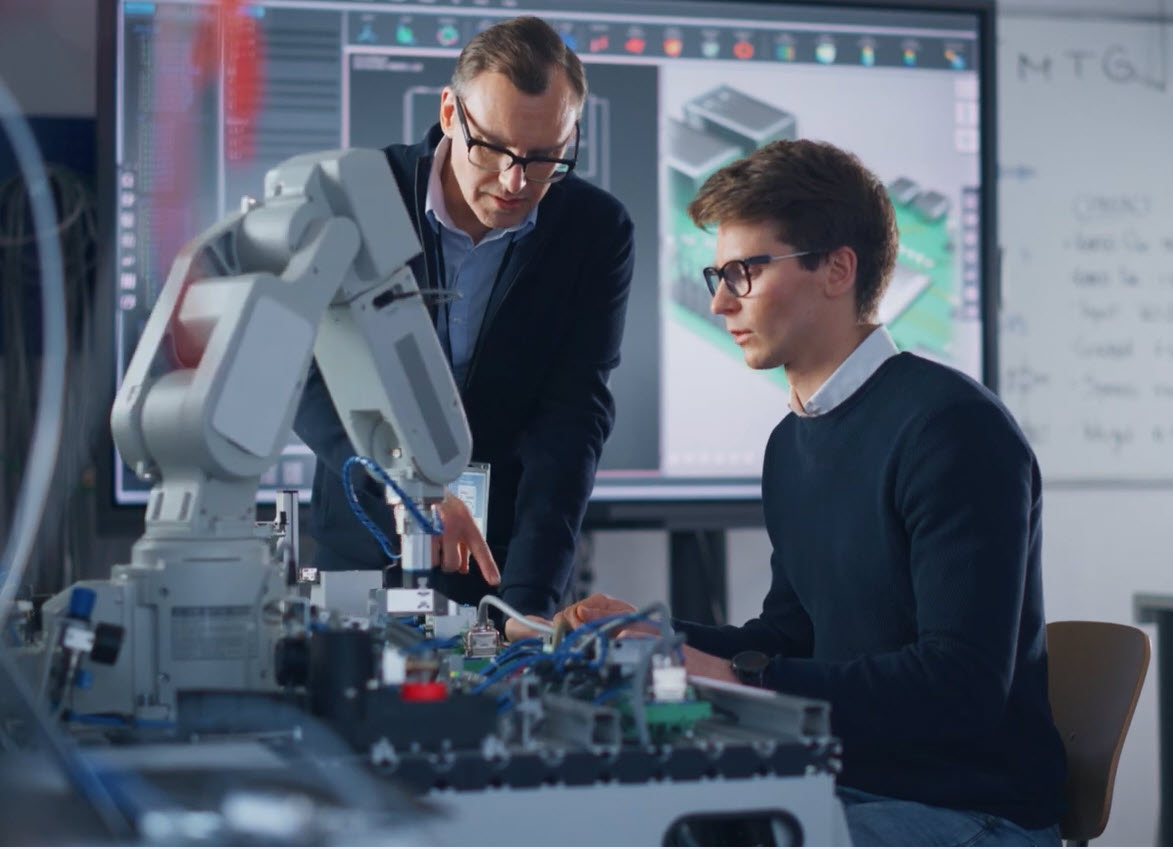AI Expectations, Soft Skills, and Young Professionals
AI Expectations, Soft Skills, and Young Professionals


As generative AI revolutionizes STEM, employers are growing wary of investing in upskilling and devoting precious energy to seemingly endless transformation.
From diagnosing cancer more accurately to large language models making coding more precise, generative artificial intelligence (AI) advances are impacting every aspect of STEM. And when it comes to accelerating mechanical engineering processes, generative design is taking the forefront. The technology promises to eventually enhance systems and be cost-effective. But keeping up is challenging as employers must prepare to upskill and invest in seemingly endless transformation.
Amid this upheaval, the Specialist Staffing Group surveyed more than 2,500 industry professionals and focused on AI and STEM, the impacts of trust in the workplace, and the value of soft skills and technical expertise. According to “How the STEM World Works: Navigating the New Era of AI and Trust,” researchers found that U.S. STEM workers currently waste over six hours a week due to lack of access to advanced AI tools.
“Businesses need to implement AI-related changes to boost productivity. The reluctance to embrace AI risks our economic future,” said Matt McManus, president, Specialist Staffing Group. “STEM professionals can clearly identify AI’s benefits. Business leaders must catch up with rapid technological development and be more open-minded about AI. Failing to act now hinders growth and risks losing top talent.”
Because of the rapidly evolving technological landscape, engineers must be risk takers and integrate AI into their existing workflows, McManus explained. Also, if they want to enhance operational efficiency and workplace productivity they must look seriously at AI. Stressing that as AI continues to advance, staying in the “forefront of its capabilities and applications is essential for maintaining a competitive edge.”
McManus pointed to one of the biggest impacts on the U.S. STEM workforce’s deficiency in AI integration. “Professionals are losing an estimated 6.18 hours per week due to inefficiencies, which equates to over $10 billion in lost productivity weekly,” he explained.
Specialist Staffing Group’s AI study uncovered that 75 percent of the U.S.’s 36.9 million STEM professionals recognized AI’s potential to drive business growth. “This solidifies the fact that rather than viewing AI as a disruptor, engineers should embrace it as a transformative tool that augments problem-solving, optimizes decision-making, and streamlines complex processes,” McManus said. In fact, 75 percent of U.S. respondents said the adoption of advanced technologies like AI would have a positive impact on their organizations' growth, yet 69 percent rate the level of implementation as average or lower.
While technical expertise is fundamental to engineering, the growing need for cross-disciplinary collaboration makes strong soft skills essential, McManus added. “Effective communication, conflict resolution, and emotional intelligence are critical for fostering innovation and maintaining a cohesive work environment,” he added.
“We’ve observed a growing preference among employers who weigh a candidate’s ability to inspire as equally important as technical proficiency. Engineers who can clearly articulate ideas, facilitate teamwork, and engage in meaningful discourse drive organizational success beyond their individual contributions,” he said.
According to the report, soft skills are preferred over hard skills by employees regarding both their managers (56 percent versus 44 percent) and organizational leadership (60 percent versus 40 percent). Moreover, 68 percent of respondents said the ability to inspire and motivate is a more important leadership skill than technical expertise. And less than a quarter of respondents (23 percent) agreed that high-performing teams are often led by leaders with stronger hard skills than soft skills.
“At Specialist Staffing Group, we prioritize candidates who demonstrate a healthy balance of advanced technical knowledge and strong people skills—both of which are fundamental to thriving in today’s STEM industries,” McManus added.
The study revealed that less than half (40 percent) trust leadership to make decisions in the long-term interest of the organization. And more specifically, 44 percent of employees don’t trust they will be fairly compensated and rewarded for work successes. (That number jumps to 65 percent when considering those who are neutral.)
Sadly, only 39 percent of respondents said leadership takes staff well-being seriously. And just over a third (35 percent) of respondents said they’re committed to staying with their current organization for the near future. About 59 percent of STEM professionals said that working within a trusted organization directly enhances productivity, McManus explained. “But trust doesn’t just happen. Establishing trust within an organization necessitates a foundation of transparency, equitable leadership, and active employee engagement,” he said.
 In our organization, we work to emphasize the importance of continuous and transparent communication from leadership, reinforcing a culture of trust from the outset, he said. “We bring this mindset to how we manage client relationships and advise our candidates. When we consult with the organizations we serve, we encourage them to prioritize employee well-being through structured support systems, recognition programs, and opportunities for professional growth. In STEM industries—where precision, accountability, and collaboration are paramount—strong internal communication and a culture of trust directly impact talent retention, job satisfaction, and overall organizational success,” McManus explained.
In our organization, we work to emphasize the importance of continuous and transparent communication from leadership, reinforcing a culture of trust from the outset, he said. “We bring this mindset to how we manage client relationships and advise our candidates. When we consult with the organizations we serve, we encourage them to prioritize employee well-being through structured support systems, recognition programs, and opportunities for professional growth. In STEM industries—where precision, accountability, and collaboration are paramount—strong internal communication and a culture of trust directly impact talent retention, job satisfaction, and overall organizational success,” McManus explained.
The dynamic interplay between experienced engineers and emerging professionals presents a valuable opportunity for reciprocal learning, McManus said. “While seasoned engineers provide mentorship through industry expertise and strategic insight, younger professionals often bring fresh perspectives, an intuitive grasp of emerging technologies, and a deep familiarity with AI-driven tools,” he said.
This knowledge exchange accelerates workplace innovation and enhances productivity. “Mentorship programs that promote two-way learning support professional growth and help engineering teams stay adaptable and innovative. Bridging the generational knowledge gap is imperative for cultivating an adaptive and future-ready workforce,” he said.
Cathy Cecere is membership content program manager.
Amid this upheaval, the Specialist Staffing Group surveyed more than 2,500 industry professionals and focused on AI and STEM, the impacts of trust in the workplace, and the value of soft skills and technical expertise. According to “How the STEM World Works: Navigating the New Era of AI and Trust,” researchers found that U.S. STEM workers currently waste over six hours a week due to lack of access to advanced AI tools.
“Businesses need to implement AI-related changes to boost productivity. The reluctance to embrace AI risks our economic future,” said Matt McManus, president, Specialist Staffing Group. “STEM professionals can clearly identify AI’s benefits. Business leaders must catch up with rapid technological development and be more open-minded about AI. Failing to act now hinders growth and risks losing top talent.”
STEM's AI Expectations
Because of the rapidly evolving technological landscape, engineers must be risk takers and integrate AI into their existing workflows, McManus explained. Also, if they want to enhance operational efficiency and workplace productivity they must look seriously at AI. Stressing that as AI continues to advance, staying in the “forefront of its capabilities and applications is essential for maintaining a competitive edge.”
McManus pointed to one of the biggest impacts on the U.S. STEM workforce’s deficiency in AI integration. “Professionals are losing an estimated 6.18 hours per week due to inefficiencies, which equates to over $10 billion in lost productivity weekly,” he explained.
Specialist Staffing Group’s AI study uncovered that 75 percent of the U.S.’s 36.9 million STEM professionals recognized AI’s potential to drive business growth. “This solidifies the fact that rather than viewing AI as a disruptor, engineers should embrace it as a transformative tool that augments problem-solving, optimizes decision-making, and streamlines complex processes,” McManus said. In fact, 75 percent of U.S. respondents said the adoption of advanced technologies like AI would have a positive impact on their organizations' growth, yet 69 percent rate the level of implementation as average or lower.
Soft skills and upskilling
While technical expertise is fundamental to engineering, the growing need for cross-disciplinary collaboration makes strong soft skills essential, McManus added. “Effective communication, conflict resolution, and emotional intelligence are critical for fostering innovation and maintaining a cohesive work environment,” he added.
“We’ve observed a growing preference among employers who weigh a candidate’s ability to inspire as equally important as technical proficiency. Engineers who can clearly articulate ideas, facilitate teamwork, and engage in meaningful discourse drive organizational success beyond their individual contributions,” he said.
According to the report, soft skills are preferred over hard skills by employees regarding both their managers (56 percent versus 44 percent) and organizational leadership (60 percent versus 40 percent). Moreover, 68 percent of respondents said the ability to inspire and motivate is a more important leadership skill than technical expertise. And less than a quarter of respondents (23 percent) agreed that high-performing teams are often led by leaders with stronger hard skills than soft skills.
“At Specialist Staffing Group, we prioritize candidates who demonstrate a healthy balance of advanced technical knowledge and strong people skills—both of which are fundamental to thriving in today’s STEM industries,” McManus added.
Trust in leadership
The study revealed that less than half (40 percent) trust leadership to make decisions in the long-term interest of the organization. And more specifically, 44 percent of employees don’t trust they will be fairly compensated and rewarded for work successes. (That number jumps to 65 percent when considering those who are neutral.)
Sadly, only 39 percent of respondents said leadership takes staff well-being seriously. And just over a third (35 percent) of respondents said they’re committed to staying with their current organization for the near future. About 59 percent of STEM professionals said that working within a trusted organization directly enhances productivity, McManus explained. “But trust doesn’t just happen. Establishing trust within an organization necessitates a foundation of transparency, equitable leadership, and active employee engagement,” he said.

Is it better to be a generalist or pursue a niche?
For new and even established mechanical engineers, is pursuing advanced credentials, degrees, or specializations key to staying competitive?
Young professionals
The dynamic interplay between experienced engineers and emerging professionals presents a valuable opportunity for reciprocal learning, McManus said. “While seasoned engineers provide mentorship through industry expertise and strategic insight, younger professionals often bring fresh perspectives, an intuitive grasp of emerging technologies, and a deep familiarity with AI-driven tools,” he said.
This knowledge exchange accelerates workplace innovation and enhances productivity. “Mentorship programs that promote two-way learning support professional growth and help engineering teams stay adaptable and innovative. Bridging the generational knowledge gap is imperative for cultivating an adaptive and future-ready workforce,” he said.
Cathy Cecere is membership content program manager.



